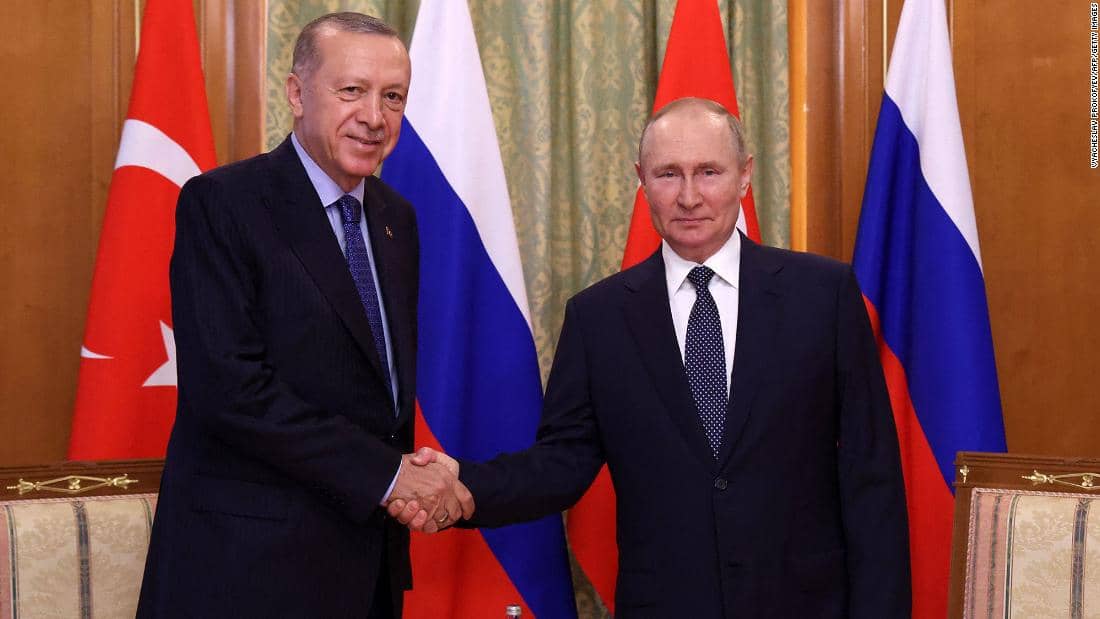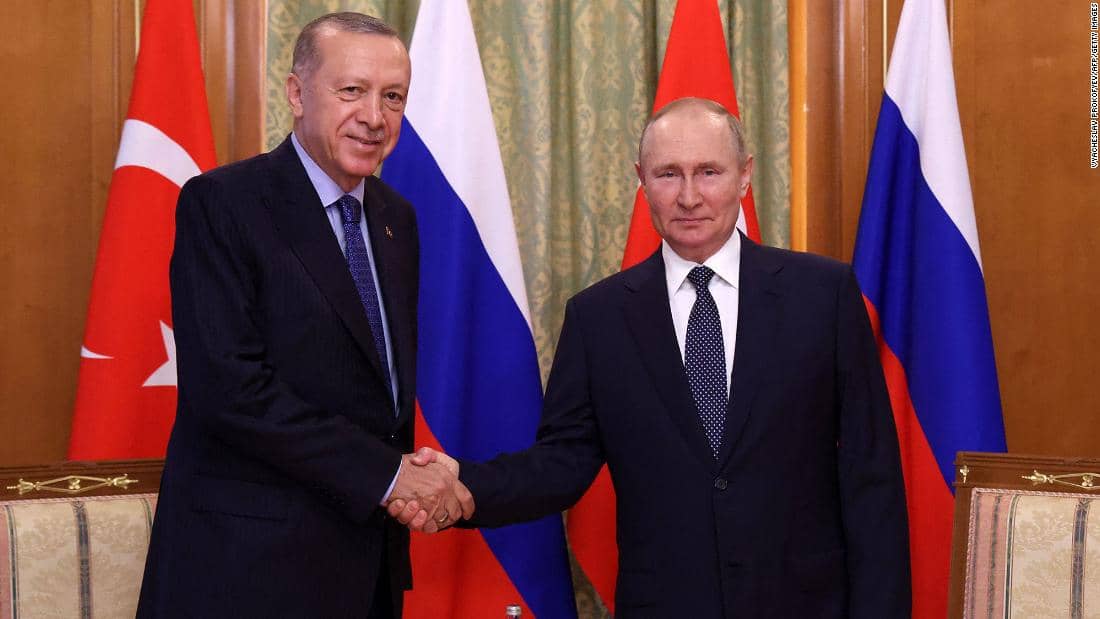But in other ways, some of the region’s countries have prospered immensely as the fighting rages on, adding hundreds of billions of dollars to their coffers. Here are four ways the Ukraine
But in other ways, some of the region’s countries have prospered immensely as the fighting rages on, adding hundreds of billions of dollars to their coffers.
Here are four ways the Ukraine war has affected the Middle East over the last six months:
Energy exporters are cashing in
Strongmen feel emboldened
Regional strongmen that once came under harsh criticism from the West appear to be back in favor.
The war has also allowed Turkish President Recep Tayyip Erdogan to position himself as an indispensable figure in the international order. Faced with a sinking economy at home and elections next year, he has skillfully used his country’s geopolitical position to extract concessions for Turkey abroad by delaying the accession of Nordic countries to NATO. Erdogan has also maintained cordial relations with Russia while publicly opposing the war, selling coveted drones to Ukraine and even mediating between the belligerents.
Alliances are shifting
Food and inflation crises raise tensions
The first ship carrying grain left Ukraine on August 1 and was initially bound for Lebanon. The shipment however changed course after Lebanese buyers refused the delivery, so it sailed to Egypt instead, according to Reuters.
The digest
US airstrikes hit Iran-backed groups in Syria
The US military conducted airstrikes Tuesday targeting Iran-backed groups in Syria’s Deir Ezzor, US Central Command said in a statement. The strikes targeted “infrastructure facilities used by groups affiliated with Iran’s Islamic Revolutionary Guard Corps.” No one was killed in the attack, according to an initial assessment by the US military, but a Syrian activist group said at least 10 people were killed and three were wounded.
- Background: American troops have been present in Syria since 2015 to combat the Islamic State, which has often brought them into conflict with Iran-backed groups. Israeli airstrikes targeted the warehouses at the same location in January 2021, according to Syria’s state news agency. The attack comes amid reports of indirect talks on reviving the nuclear deal between Iran and the US reaching an advanced stage.
- Why it matters: As talks advance, the US may be sending a message that even though it is working on reaching an agreement with Iran, it will continue to target Iran-backed groups in the region. Washington has refused to remove the Iranian Revolutionary Guard Corps from its list of terrorist organizations, which Tehran had previously demanded.
Turkey says it has no preconditions for dialogue with Syria
In a softening of its stance, Turkish Foreign Minister Mevlut Cavusoglu said Ankara has no preconditions for dialogue with Syria but any talks should focus on security on their border.
- Background: Turkey cut ties with Damascus 10 years ago in response to the uprising in Syria and backed rebels fighting to topple the Bashar al-Assad regime. But Turkey has in recent years maintained contact with the regime, directly through intelligence channels and indirectly through the Astana Group process, which aims to solve the Syrian civil war.
- Why it matters: Turkish President Erdogan has indicated he wants to launch yet another military incursion into northeast Syria. Over decades of tension, Turkey has already launched three military operations against Kurdish fighters in Syria’s north, the latest of which was in 2019. Asked about prospects for talks, Cavusoglu said they would need to have specific goals. “No conditions for dialogue, but what is the aim, the target? It needs to be goal-oriented,” he said.
Beirut port silo collapses two years after fatal blast
The northern wheat silo damaged after the deadly Beirut port blast in 2020 collapsed on Tuesday, state-run NNA reported. A large dust cloud was sent into adjacent areas of the port after the implosion as smoke from fires continued rising from the debris.
- Background: On August 4, 2020, hundreds of metric tons of ammonium nitrate ignited, sparking a massive blast in the Lebanese capital’s port, killing more than 215 people and injuring thousands. The silos had been on fire since then. Over the past month, segments of the silos were collapsing gradually as the army continued cordoning the area.
- Why it matters: The silos had become a symbol of dysfunction in Lebanon. Earlier this year the government had rolled out a plan to demolish them. Civil society groups, who see the silos as a memorial to the blast, reacted with outrage, and the plan was scrapped.
What to watch
Water shortages have turned the lush green marshlands of Iraq into a desolate desert. Watch Jomana Karadsheh’s report on the effect of climate change in the country.
What’s trending
Lebanon: #Bachir_Gemayel
Twitter users in Lebanon are marking 40 years since Bashir Gemayel was elected President by the country’s parliament. He was assassinated before taking office in 1982.
A deeply divisive figure in Lebanon’s history, Gemayel founded and led the Lebanese Forces, the military wing of the Christian Phalange party that continues to play a role in the nation’s politics today. He was supported by many Lebanese Christians but considered a traitor by others for his cooperation with Israel, which invaded Lebanon in a 1982 war.
In October 2017, Habib al-Shartouni, a member of Lebanon’s Syrian Social Nationalist Party, was found guilty in absentia by a Lebanese court for planting the bomb that killed Gemayel.
Oman: #Turn_on_Discord
Omanis have turned to Twitter to complain about not being able to access popular social media platform Discord.
With over 150 million active monthly users, Discord plays a big role in the lives of gamers as it serves as a chat room for private games as well as those streaming their games.
Discord also grew to become a significant element in the utility function of non-fungible tokens (NFTs), which are growing in popularity around the Gulf states.
Saudi Arabia: #How_many_wives_would_you_take
While one user said marriage is not a “priority” for him, while another lamented that men could hardly attend to one wife. One user tweeted a photo with the number three.
Islam allows men to take up to four wives. While the practice isn’t widely adopted in the Muslim world, it isn’t uncommon either. Women can only take one husband.
Don't Miss
‘Putin is a killer,’ says Ukraine goalkeeper as he sends a message of hope to his country Shaktar Donetsk and
US national security adviser Jake Sullivan confirmed Sunday that the US will allow European countries to start training Ukrainian fighter
A view of the Kremlin in Moscow, Russia, on September 19, 2021. (Alexander Nemenov/AFP/Getty Images) Senior Russian officials at the
5 ways to deal with the post-vacation blues

(CNN) — After two years of a pandemic, ever-changing travel restrictions and mandated Covid-19 tests, the summer of 2022 signaled vacations would finally be back in vogue.
Whatever your vacation story, here are five tips from the experts to help you deal with a case of the post-vacation blues.
1. Plan a buffer for when you come back
“I often see people having a really hard time with the post-vacation blues when it’s like whiplash — so last night I was on a beach and now I’m in the office — instead if possible try to plan a buffer day so you can exhale and have some time to just be able to readjust,” she says.
2. Try to maintain a vacation mindset
“Remember that ending the vacation doesn’t mean ending the fun,” says Santos. “We can find ways to get a bit more of that travel feeling in if we continue that tourist mindset into life back home. Maybe try a new restaurant or take a walk through a new neighborhood.”
“It’s fascinating that what people will do on vacation they won’t do at home — if you’re getting a massage when you’re away, waking up to see the sunrise or walking around a town, try to do some of that when you come home.”
Thomas also suggests cooking some of the dishes you enjoyed while you were away to keep the experience going. “When I go to Italy and eat pasta pomodoro, probably for a good month after that when I get home, I keep making it or ordering it instead of letting that process fade out.”
3. Practice gratitude
“Take some time to replay your positive travel memories back,” Santos advises. You could make an album, journal or just remind yourself of all the good experiences you were able to have if you were lucky enough to get away.
“You may have heard the advice that you should invest in experiences not things. Turns out one of the reasons that’s the case is that experiences make for fonder memories than our materials purchases — we can get a happiness boost not just from experiencing a vacation, but from remembering it,” Santos adds.
As well as being grateful for what you had, try and practice gratitude in your daily life says Bonior, explaining that while gratitude is good for us, many people misunderstand what it means.
“People tend to think gratitude means you need to count your blessings for everything, you can’t be upset about anything, somebody else has it worse than you do so you should be grateful, but gratitude in reality means leaning into everything — being able to truly engage and recognize that we’re lucky but also not being afraid to acknowledge the dark spots.”
“True gratitude doesn’t mean you have to be happy and feel blessed all the time, it means to realize the whole life experience is something pretty amazing and I’m here for it,” she adds.
4. Exercise
“Exercising doesn’t mean you won’t be depressed but it does helps mitigate it,” Bonior says, adding that exercise doesn’t have to be intense or look a certain way — even a walk can be a boost for your physical and mental health or dancing in your room she explains.
In addition, exercise is widely known to improve sleep, lower blood pressure, reduces stress and boost your mood — so although you may feel like moping around the house post-vacation, it’s a good idea to force yourself out and about for a mood inducing boost.
5. Acknowledge your feelings
Talk to others about how you feel, commiserate with other travelers or journal — it’s important to stay connected with friends and loved ones and not withdraw.
“The research shows that for us to be able to just articulate that we have a certain emotion, that makes that emotion feel less scary so we feel more in control. It also helps us avoid black and white thinking,” Bonior says, explaining that we can have multiple emotions at the same time like being sad but excited.
Of course if you’re feeling an overwhelming sense of dread about your routine or your job, it may signal a need for change or a revaluation of where you want to be. If the symptoms persist or get worse you may also want to seek out some professional help to address other underlying causes.
“If your vacation didn’t go so well, you can get a happiness boost here by trying to figure out what you learned,” says Santos. “The act of expressively journaling about what went wrong can help you figure out what insights you’ve gotten or how you’ve grown. At the very least, even the worst holidays can turn into funny stories that we can share with friends for a boost of social connection.”
Top photo credit: ALBERTO L. POMARES G./iStockphoto/Getty Images/iStockphoto
Don't Miss
CNN — If you’re a parent, heading out the door before a car ride with the kids probably goes a
Editor’s Note: Monthly Ticket is a CNN Travel series that spotlights some of the most fascinating topics in the travel
CNN — Neil Diamond sang “Sweet Caroline” at the Broadway opening of his musical” A Beautiful Noise,” five years after
When they last met, in February in Beijing during the Winter Olympics, they proclaimed their friendship had “no limits.” Since then, Russia has sought ever closer ties with China as Europe and the United States responded to the invasion with wave after wave of sanctions.
Beijing has carefully avoided violating Western sanctions or providing direct military support to Moscow. This balancing act, experts say, is a sign that Xi won’t sacrifice China’s economic interests to rescue Putin, who arrived at the Shanghai Cooperation Organization summit in Uzbekistan this week with his army retreating from large swathes of Ukrainian territory.
But the trading relationship is booming, in a lopsided way, as Russia desperately seeks new markets and China — an economy 10 times the size — scrambles for cheap commodities.
Record trade
China’s spending on Russian goods soared 60% in August from a year ago, hitting $11.2 billion, according to Chinese customs statistics, surpassing July’s 49% gain.
Its shipments to Russia, meanwhile, jumped 26% to $8 billion in August, also accelerating from the previous month.
For the first eight months of this year, total goods trade between China and Russia surged 31% to $117.2 billion. That’s already 80% of last year’s total — which stood at a record $147 billion.
“Russia needs China more than China needs Russia,” said Keith Krach, former Under Secretary of State for Economic growth, Energy and the Environment in the United States.
“As the war in Ukraine drags on, Putin’s losing friends fast and increasingly becoming more and more dependent on China, whose economy is 10 times the size of Russia’s,” he added.
For China, Russia now accounts for 2.8% of its total trade volume, slightly higher than the 2.5% share at the end of last year. The European Union and United States have much bigger shares.
The Russian central bank stopped publishing detailed trade data when the war in Ukraine started. But Bruegel, a European economic think tank, analyzed statistics from Russia’s top 34 trading partners recently and estimated that China accounted for roughly 24% of Russia’s exports in June.
“China-Russia trade is booming because China is taking advantage of the Ukraine crisis to buy Russian energy at a discount and replace Western firms that have exited the market,” said Neil Thomas, a senior analyst on China at Eurasia Group.
Yuan the new dollar in Russia?
Russian companies and banks are also increasingly turning to the yuan for international payments.
For Beijing, it’s a boost to its ambitions to make the yuan a global currency.
“Increased Russian use of the yuan also helps to inch forward China’s long-term goals to make the redback a global currency, to insulate itself from Western financial sanctions, and to enhance its institutional power in international finance,” said Thomas from Eurasia Group.
For Russia, this partnership with China “is born of desperation,” said Krach.
“Because Russia has been severely weakened, in part by sanctions, Putin is willing to do a deal with a predatory power so long as it gains access to capital,” he added.
Chinese companies fill the vacuum
Chinese companies are also taking advantage of the exodus of Western brands from Russia.
Chinese cars have also flooded Russia.
Limits in ‘no limits’ partnership
But there are also significant limits in the China-Russia partnership, analysts said.
China is not providing military, commercial, or technological support that would “risk significant US sanctions on China,” said Thomas at Eurasia Group.
“Beijing will not sacrifice its own economic interests to support Moscow,” he said.
Fearing a US backlash, China has so far “steadfastly” refused to violate international sanctions against Russia, forcing Moscow to request military support from North Korea, said Craig Singleton, senior China fellow at the DC-based Foundation for Defense of Democracies.
“Beijing’s refusal to violate US and international sanctions reflects its begrudging acceptance that China remains reliant on Western capital and technology to sustain its ongoing development, even though Xi is personally inclined to assist Putin’s war effort,” he said.
Moreover, China’s rapid economic slowdown this year will further constrain Xi’s willingness to help Putin. The Chinese president won’t want to risk anything that further destabilizes the economy mere weeks before he’s poised to secure an historic third term at the Communist Party’s congress.
What the future holds
Future relations will likely remained strained, and China will want to keep its options open, analysts said.
“There’s always been mistrust between the two regimes, which historically treated each other as rivals,” Krach noted.
The current Sino-Russia partnership is mainly a “defensive” one, enhanced by Beijing and Moscow’s shared view that NATO and the United States pose a “palpable national security threat,” said Susan Thornton, senior fellow and visiting lecturer at Yale Law School.
“Russia’s war in Ukraine is not in China’s interest, but given Western hostility, China will not oppose Russia,” she added.
Don't Miss
Editor’s Note: Monthly Ticket is a CNN Travel series that spotlights some of the most fascinating topics in the travel
But in other ways, some of the region’s countries have prospered immensely as the fighting rages on, adding hundreds of
Hailed by Tehran as a successful entry into “a new stage of economic cooperation,” the soon-to-be accession comes as hopes













